December 12, 2016
For the last two years, Tim Ferriss has interviewed more than 200 world-class performers, ranging from super celebs like Jamie Foxx and Arnold Schwarzenegger to professional athletes and icons of powerlifting, gymnastics, surfing and beyond, to legendary Special Operations commanders and black-market biochemists.
For many of his guests, this is the first time they’ve agreed to a two-to-three-hour interview, and this unusual depth has helped him create a massive collection of tools, tactics, and ‘inside baseball’ you won’t find anywhere else.
Anyways, just this week, Tim took his entire notebook of high-leverage tools that he has vetted, explored, and applied to his own life, and published it for the entire world to delve into – all in the form of a nearly 700 page book that could probably double as a self-defense weapon. The name of the book, entitled Tools of Titans: The Tactics, Routines, and Habits of Billionaires, Icons, and World-Class Performers, delves into the dozens of personal health, wisdom and wealth strategies and philosophies Tim has picked up from his guests and used successfully in high-stakes negotiations, high-risk environments, and large business dealings, saving him millions of dollars and years of wasted effort and frustration.
On last Wednesday's podcast, you got to to tune in as I put Tim in the hotseat and we not only discussed his new book Tools of Titans: The Tactics, Routines, and Habits of Billionaires, Icons, and World-Class Performers, but also went far beyond and delved into difficult, deep questions about Tim's life.
However, as I am prone to do, in addition to interviewing Tim about his book, I have also dog-eared, highlighted, and generally abused Tools of Titans as I scoured through the pages looking for the tips and tricks I think you'll find most enchanting, intriguing or useful. Below, in order of appearance within the book, are 9 of the best tips I discovered…
Page XX In Introduction: What Do *They* Have In Common?
I was fascinated by several of the patterns that Tim highlights as extremely common habits among his interviewees, including:
-More than 80% have some form of daily meditation or mindfulness practice.
-A surprising number of the males over 45 years old (not the females, interestingly) either skip breakfast or only consume the scantest of fare for breakfast. This could be why this technique doesn't work so well for females.
-A large proportion of his guests use the “Chilipad” for cooling the body (this is a new under-the-mattress body cooling/heating toy I've recently picked up and found to have significantly increased deep sleep percentages and sleep latency).
-Many listen to single songs on repeat for focus, such as “Last Of The Mohicans” by free solo climbing phenom Alex Honnold or “Tonight Tonight” by obstacle course racer Amelia Boone. I have not ever done this and, being a guy who rarely watches the same movie twice or reads the same book twice, don't find it an incredibly attractive idea compared to the use of binaural beats for focus. But will probably try it in the near future to see whether it does indeed enhance productivity or focus.
Anyways, there are plenty of other common threads among Tim's guest, but those above are a few I found interesting or worth a try.
Page 14: Try Training Like A Gymnast
During our interview, I ask Tim if his body has changed dramatically in the past year, and his reply was an definitive “yes”. Specifically, Tim's biceps strength and size, core stability, mobility and explosiveness all notably increased the past year via the use of a strategy called Gymnast Strong.
Fortunately, gymnastics rings, walls, railings, bars and all other manner of chimpanzee-like training equipment abound at the Greenfield home, so here are several photos of moves lifted from Tim's book that I am going to attempt to perfect over the next month to see what happens to my own body. Who knows? I may wind up wearing a Team USA Men's Unitard and attempting triple-handstand-360-degree-twisted-somersault-backflip-swings.
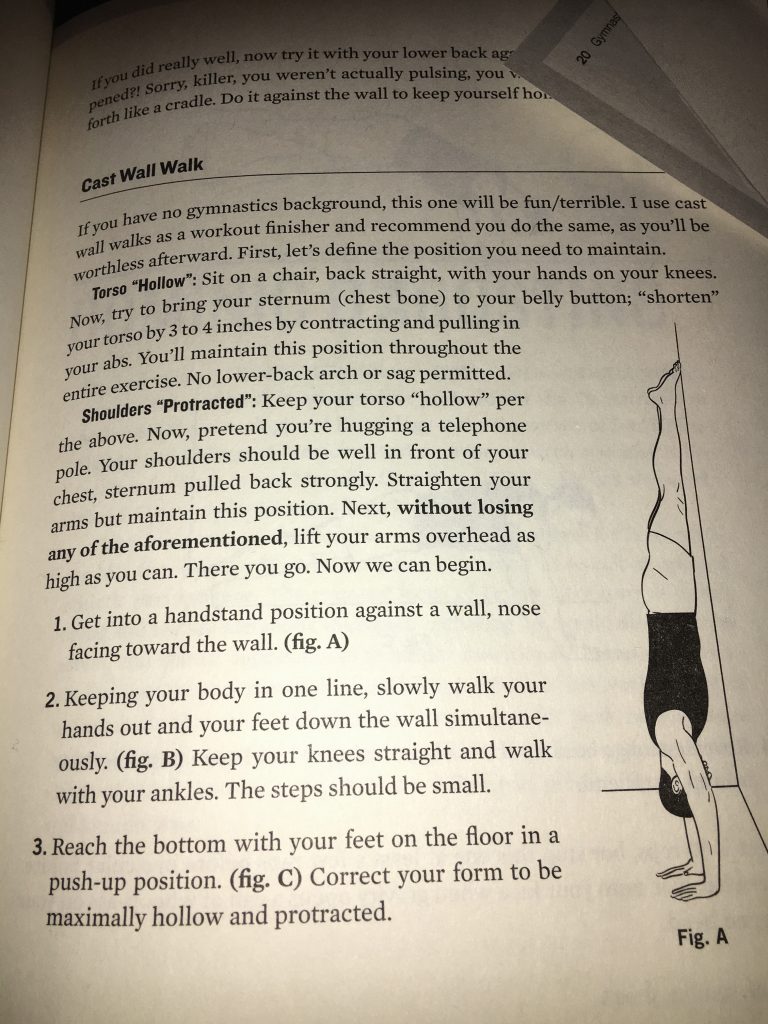
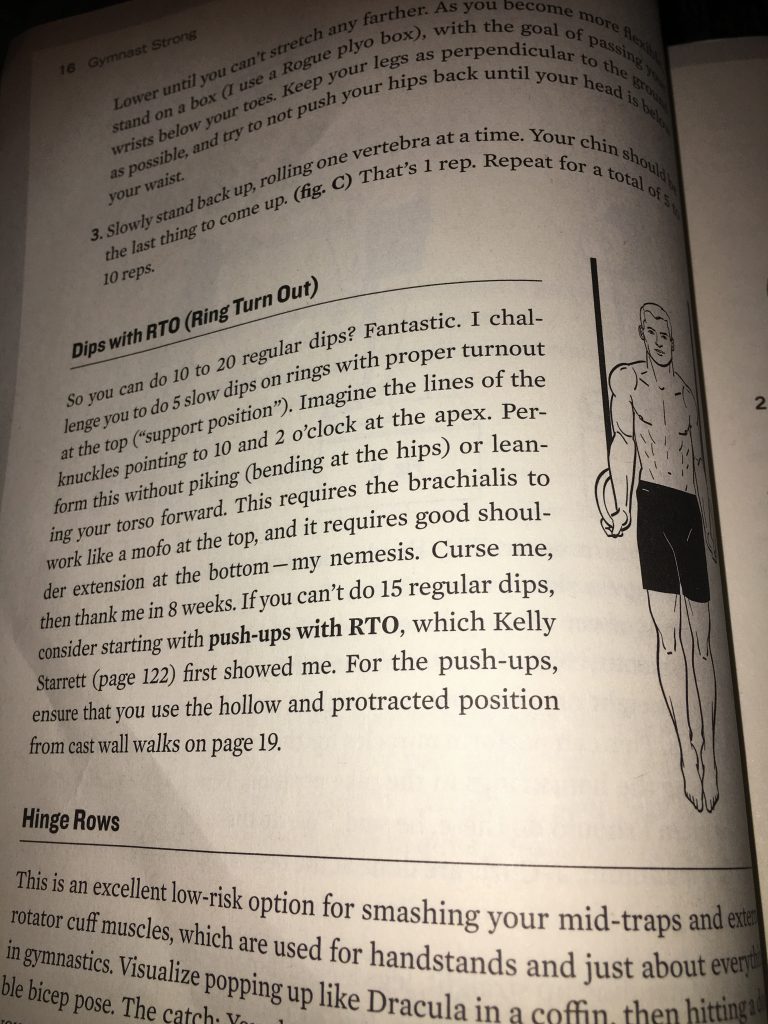
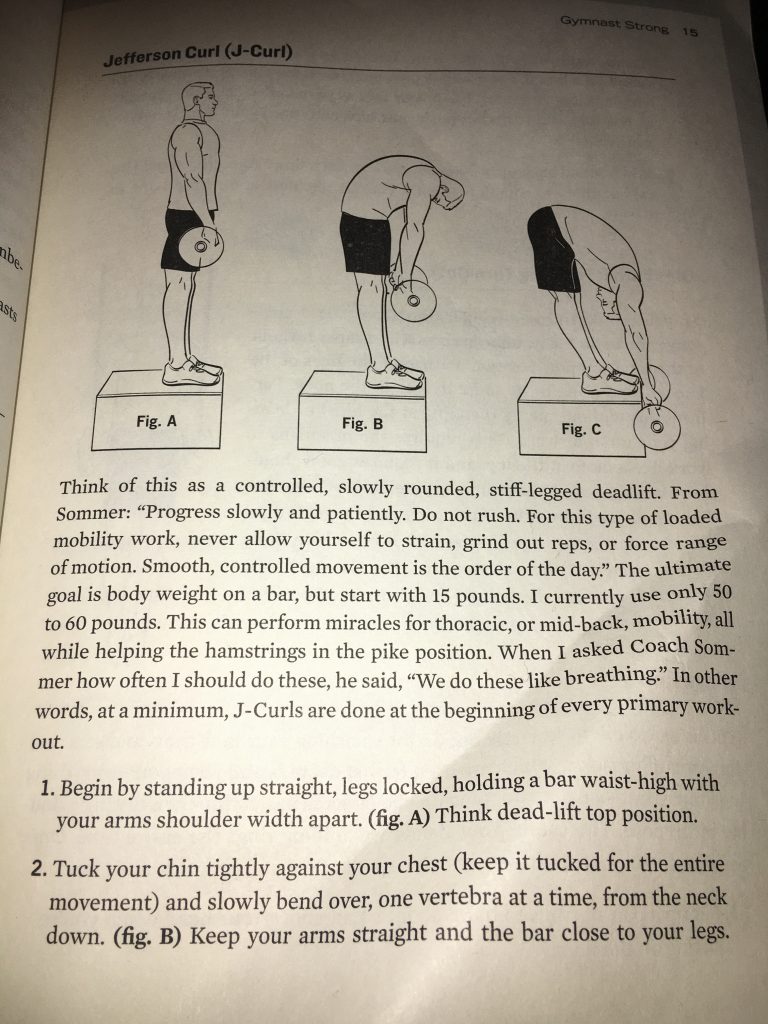
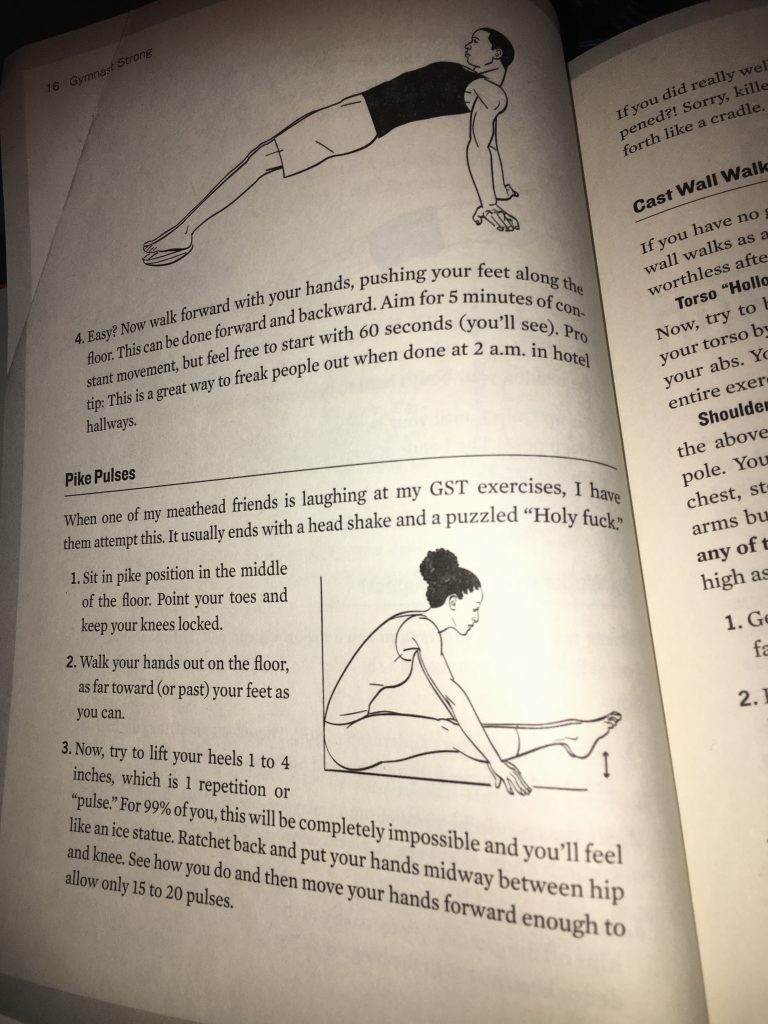
Page 83: Tim's Six-Piece “Gym In A Bag”
Tim takes the following six items with him wherever he travels, and actually purchases several sets, which live in trunk stored at hotels in the most common locations he frequents, such as L.A. and New York City. They are, in no particular order of importance:
-“VooDoo Floss“: rubber ACE bandages for increasing joint hydration and range-of-motion (can also be used for many of the techniques I describe in this mobility article.
-Furniture Sliders: check out the strange bridging motion in the gymnast photos above – just one of the ways Tim highlights in the book for using a cheapo pair of furniture sliders.
–Rumble Roller: also one of own favorite workout tools, and available in both travel and full-size versions. Here's a video of the mobility routine I perform ever Wednesday with my own Rumble Roller.
-Acupressure Mat: Tim swears by this as a healing modality for injuries, but I personally use mine for napping. How? Simply lay in a corpse-like pose with your back on this makeshift bed of nails for about 10 minutes, palms turned out and body completely relaxed. Then, chock full of the relaxing endorphins the acupressure spikes elicit your body to release, crawl into bed and collapse into a pile of your own drool for a power nap. Tim recommends the Nayoya Acupressure Mat.
-Goat Whey Protein: traveling with goat protein is based on a tip Tim picked up from his guest Charles Polliquin, based on the fact that goat whey protein (as I outline in my recent article on legal ways to increase growth hormone – is highly anabolic and, due to the small protein size and lower levels of lactose, far more digestible than the milk from most other animals. To learn more, listen to my podcast with a Joe Stout, a nutrition science researcher and goat farm owner in Central Washington.
-Mini-Parallelettes: To enhance his gymnast training, Tim uses the Vita Vibe MP12 Ultra-Light mini-parallelette bars to do moves like L-sits, planche leans and parallette handstands.
If I were to add one essential item to Tim's gym-in-a-box, it would be one of the most potent portable forms of resistance training that exists: a basic suspension strap.
Page 102: A Psychedelic Dosing Schedule
For increasing everyday well-being, developing empathy, and intensively exploring your inner self, Tim outlines the following psychedelic microdosing schedule. I'm quite curious about all three compounds he describes below, and while I've personally discovered intense insights and vivid, lucid, remarkable experiences (mostly in nature, such as hikes and river rafting) via the use of psilocybin mushroom dosing, I haven't yet tried the other two compounds Tim mentions below (ibogaine and ayahuasca). They are, however, on my “list” of compounds to responsibly experiment with during 2017.
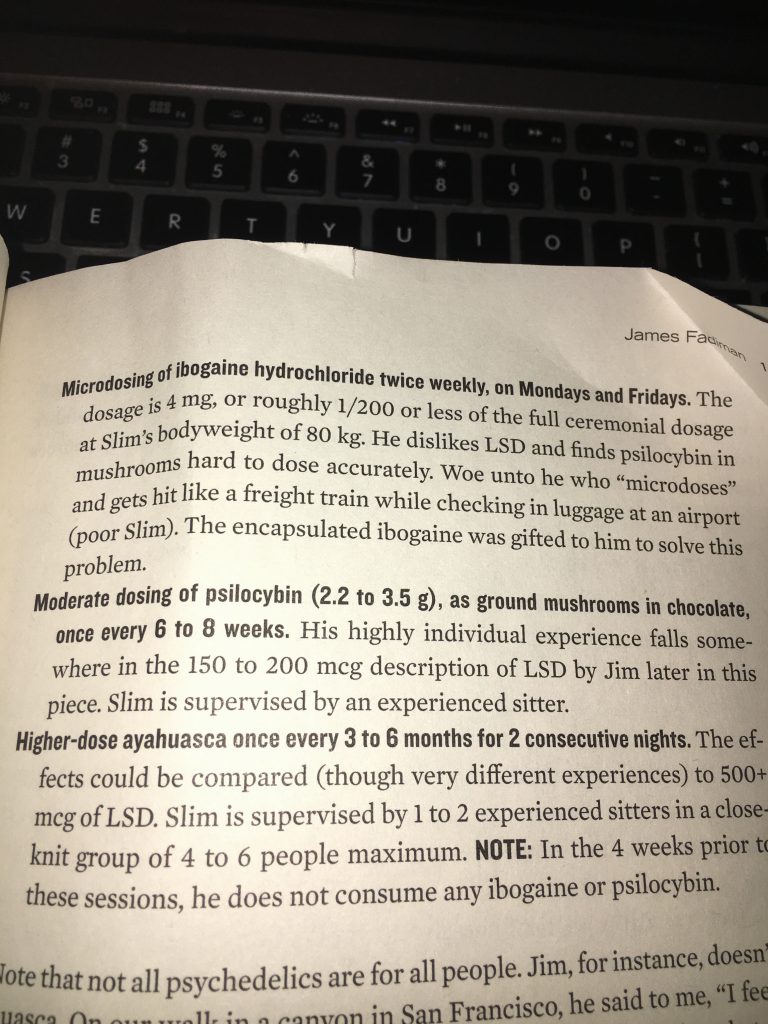
Page 248: James Altucher's “Daily 10” Practice
James Altucher, an eccentric, big-haired, highly successful entrepreneur (who has written at least two books I highly recommend: “The Power Of No” and “Choose Yourself“), engages in a “Daily 10” practice to generate new ideas, to develop brain muscles, to get constant creativity on demand and to gain the ability to think far outside the box. Here are a few examples of Daily 10 lists James creates:
-10 ideas I can make new
-10 ridiculous things I would invent
-10 books I can write
-10 business ideas for Google/Amazon/Twitter
-1o people I can send ideas to
-1o podcast ideas or videos I can shoot
-10 industries where I can remove the middleman
-10 things I disagree with that everyone else assumes is religion
-10 ways to take old posts of mine and make books out of them
-10 people I want to be friends with
-10 things I learned yesterday
-10 things I can do differently today
-10 ways I can save time
-10 things I learned from X (where X is someone he's recently spoken with or read a book about)
-10 things I'm interested in getting better at
-10 things I was interested in as a kid that might be fun to explore now
-10 ways I might try to solve a problem I have
Oh what the heck, let's give it a try, shall we? How about “10 books I can write”? Here's my brain dump (and feel free to let me know which one you think I actually should write).
-The Jet Lag Cure
-The Longevity Code
-How To Raise Tiny Superhumans
-Beyond Fat Loss
-Why Every Diet Book Is Pure Bullsh#$
-The Biohacked Home
-The Invisible: Hidden Variables That Can Make You Superhuman
-The Look-Good-Naked Cookbook: 100 Fast, Go-To Recipes For A Sculpted Body
-The Dirty Kitchen: Fermenting Made Easy
-The Performance Manifesto: 40 Uncommon Training & Recovery Strategies To Destroy Your Competitors
Page 258: A Few Ninja Investing Tips From Tim Ferriss
As an influencer, Tim invested a very small amount in a few select startups, and did his best to deliver above and beyond the value of his investments. In other words, he wanted the founders to ask themselves, “Why the hell is this guy helping us so much for a ridiculously small amount of equity?”. By doing this, he established a reputation as a major value-add, not just a human checkbook.
Next, he began negotiating blended agreements with startups involving some financial investment, but additional advisory equity.
Finally, he made the jump to pure advising, meaning that by the end of the first year of this strategy, more than 70% of his startup “investments” were made with time rather than cash, allowing him to reduce the total amount of capital invested while ultimately producing better results for the startups he was helping.
When I read through these investment tips, it certainly gives me pause.
After all, I've invested in several companies: specifically Aurora medical marijuana clinics in Canada, Botanica Seattle, EAD Labs (the cannabidiol production that synthesizes the bioabsorbable CBD I use in my top selling product NatureCBD), Thrive grocery store , Kettle & Fire Bone Broth, and Falcon Fulfillment (the warehouse/shipping service I use for shipping all my products from GreenfieldFitnessSystems.com), to name a few.
As Tim recommends, I certainly use the products and services of these companies I invest in, but I'd never given much thought to focusing more on my ability to advise and be an influencer for companies like this in the health, nutrition, longevity, biohacking and fitness sectors as opposed to simply writing checks and giving money to these companies.
Equity in exchange for advising and expertise: it's a concept I dig, since I feel I can give far greater value with my brain and education vs. my bank account.
Page 277: The Law Of Category
Once a week, I have a pop-up on my computer that displays to me a summary of a book called “The 22 Immutable Laws of Marketing“. In that book is a chapter entitled “The Law Of Category”, which is based around the following question:
“When you launch a new product, the first question to ask yourself is not “How is this new product better than the competition?” but “First what?” In other words, what category is this new product first in?
The Law of Category basically means that if you can’t be the first in a certain category then you can create a new category you can be first. For example, Charles Schwab didn't open a better brokerage firm. He opened the first discount broker. Or Amelia Earheart: she was the first woman to fly across the Atlantic Ocean, but she was only the third person overall to fly the Atlantic (behind Lindberg and Hinkler). People do not remember her because she was the third person to fly the Atlantic, but they do remember her because she was the first woman to do it.
When I was reading Tools of Titans, I realized how much value successful guys like Tim place on this law, and how I should implement it more in my own business.
For example, cannabidiol (CBD) is one of the most powerful substances I've used in the past decade. When added to or combined with just about any other compounds (such as turmeric, adaptogenic herbs, sleep supplements, etc.) it seems to vastly improve the effectiveness of those compounds, probably via stimulation of the endocannabinoid pathway and the multiple mechanism I discuss here.
So, following the “Law Of Category” exercise: what if every supplement I created were simply “insert product name here + CBD”.
Men's testosterone enhancement with CBD?
Sleep and relaxation formula with CBD? (I've actually already done that one)
Pre-workout booster with CBD?
Smart drug with CBD?
You get the idea. All those supplements are existing categories, but I could, for example, invent a new subcategory niche in those category by including cannabidiol. I would be first in that new category.First, that is, until everybody in the supplements industry reads this blog post.
Of course, other options could include things like a nootropic or smart drug compound…for hunters. Or a five-fingered, minimalist shoe…for cycling. Or a health club franchise…for airports.
Fun though experiment, eh?
Page 449: The Dickens Process
The “Dickens Process” is actually based on Charles Dickens “A Christmas Carol”, in which Scrooge is visited by the Ghosts of Christmas Past, Present and Future. Using the Dickens Process, you examine your own limiting, handicapping beliefs by answering the following questions:
-What has each belief cost you in the past, and what has it cost people you've loved in the past?
-What is each costing you and the people you care about in the present?
-What will each cost you and the people you care about 1, 3, 5 and 10 years from now?
Then, after you feel the pain of your own handicapping beliefs, you formulate one, two to three replacement beliefs to use moving forward.
This could be uncomfortable, but I'm going to dive headfirst into this process and say something I don't think I've ever really talked about in my blog or on the podcast…
…and that is this: I've always struggled with the notion that I'm judged primarily by how my body looks. From being a skinny teenager in my basement hoisting 10 pound dumbbells so that I could impress the girls at the pool to being a massive bodybuilder trying to outflex the other silly-looking, gold-flaked behemoths on stage to getting into the tightest pair of cycling spandex possible for an Ironman triathlon, much of my physical drive has been fueled by – as shallow as this may seem – the desire to look good naked.
Now don't get me wrong, there's nothing wrong with caring for your body, being functionally strong and fit, and even taking pride in your body being a temple-like display of what the human physique is truly capable of.
But taken to extremes, this constant body self-improvement quest can cost you dearly.
In the past, I've skipped important family time, social events, experiences, concerts, parties and even scrumptious meals because they didn't fit in with my gym time or body fat goals. That has cost me precious hours of my life spent with my parents, friends, family, wife and children that I'll never get back.
In the present, I've dug myself into a hole of becoming stressed, self-judgemental, worried and anxious should I ever miss a workout of not hit my allotted exercise time, often thinking about a workout while I'm, say, eating breakfast or talking on the phone. This continues to cost me not only in terms of time spent with loved ones, but also simply inhibits my ability to be mindful, present and happy to simply be “where I'm at”.
In the future, if this habit continues, I will be that father who skips his childrens' basketball games and tennis matches so that I can squeeze in my precious sauna or trail running time, that husband who doesn't have time for a Friday night date because I decided to hit the gym after a day of work, or that washed-up ex-athlete racked with joint pain from always pushing and never resting.
So what is a replacement belief?
I am more than my body. I am my mind. My personality. My creativity. My value to this world is not based on my abs or my muscle striations or how fast I can swim or how much weight I can deadlift: it is based on my God-given ability to be able to inspire others to greatness, to educate, to teach, to write, to learn, to read, and even to entertain with talents such as music and writing fiction.
As Tim says in this section of Tools of Titans, it's incredible what can happen when you stop driving with the emergency brake on.
Page 594: The 17 Questions That Could Change Your Life
In what I found to be one of the most impactful parts of the book, Tim highlights the following 17 questions that have dramatically changed his life (we dwell upon question #15 quite a bit in the podcast I recorded with Tim).
#1: What if I did the opposite for 48 hours (e.g. make sales calls only from 708:30am and 6-7:30pm instead of 9am to 5pm)
#2: What do I spend a silly amount of money on and how might I scratch my own itch (e.g. I spend a lot of money on supplements and could start a supplement company)
#3: What would I do/have/be if I had $10 million and what's my real Target Monthly Income (TMI)?
#4: What are the worst things that could happen? Could I get back here to where I am if they did happen?
#5: If I could only work 2 hours per week on my business, what would I do?
#6: What if I let them make decisions up to $100? $500? $1000? (e.g. telling his team ‘from this point forward, please don't contact me with questions about A, B or C. I trust you. If it involves less than $100, please make the decision yourself and take a note in one document so we can review and adjust each week. Just focus on making our customers happy.')
#7: What's the least crowded channel? (Tim started a podcast because it was underutilized communication medium)
#8: What if I couldn't pitch my product directly (e.g. to help with a book on fat loss, write a whole bunch of useful blog posts on fat loss rather than a bunch of big fat loss book sales letters)
#9: What if I created my own real world MBA (Tim gets into this in detail in book – focusing on real world experiences instead of formal university education)
#10: Do I need to make it back the way I lost it? (last week, I personally lost $1600 writing a check to a fake Polish company in this very trademark scam. I could try to sue them and get the money back the same way I lost it, or I could figure out a new, creative way to make $1600 which actually helps people, such as by writing a new e-book)
#11: What if I could only subtract to solve problems (what can you simplify? what can you put on your not to-do list?)
#12: What might I put into place to allow me to go off the grid for 4-8 weeks, with no phone or email?
#13: Am I hunting antelope or field mice? (based on this anecdote from a Newt Gingrich speech)
#14: Could it be that everything is fine and complete as is?
#15: What would this look like if it were easy?
#16: How can I throw money at this problem? Can I “waste money” to improve my quality of life? (e.g. forking over the cash for business class on a flight so you can arrive to where you are going well rested and able to enjoy the experience)
#17: No hurry, no pause. (you don't need to go through life huffing and puffing and red-faced, and you can get 95% of the results you want by calmly putting one foot in front of the other)
Similar to my practice of having a synopsis of the “22 Immutable Laws Of Marketing” pop up on my computer every Monday morning, reading Theodore Roosevelt's “Man In The Arena” on my coffee mug each morning, and dwelling on Heinlein's “Competent Man” quote written on the whiteboard in my office, I plan on having these 17 questions greet me at some point during each week, probably by simply having them pop up on my computer (I use the Expersis software IMOnTime for this).
Summary
Want more?
First, read Tim's new book: Tools of Titans: The Tactics, Routines, and Habits of Billionaires, Icons, and World-Class Performers.
Second, should you be a glutton for massive, multi-hundred page literary works, you can also feel free to check out The 4-Hour Body Book Review: Why Tim Ferriss’s Book Could Be A Huge Waste Of Your Time, But Might Change Your Life.
Third, you can follow these links to listen to my first podcast with Tim “Tim Ferriss Cold Thermogenesis Special Episode” or my second podcast with Tim “Behind The Scenes Of The Tim Ferriss Experiment: 15 Pounds Of Muscle, Turmeric Tea, Urban Evasion & More!“.
Finally, if you have questions, thoughts or feedback about Tools of Titans: The Tactics, Routines, and Habits of Billionaires, Icons, and World-Class Performers, or your own tips to share that you learned from the book, leave your comments below and I'll reply!


why is dr gundry against pressure cooker what is the problem with it at the end there was a cut,also do you need to take probiotics to rebuild your gut ,i have scleroderma and morgellon disease so if someone have some advices or tips they are more than welcome …
First I’ve heard of Tim’s new book! It looks very interesting indeed! especially the micro dosing of psychedelics. Thanks for the heads up, gonna read this bad boy soon!
I really appreciate your honesty in The Dickens Process. The quest for self-improvement, like everything else, comes at a cost and it’s sometimes difficult to draw boundaries. How do you balance the desire to push yourself to be your personal best with other ‘normal’ responsibilities, especially when it can require extraordinary measures to really test your personal limits and capabilities? For some personality types, including my own, it can be difficult to do something without giving it more than 100%.
As always, thank you providing in-depth science-backed information and discussing unique ideas beyond the everyday, mainstream topics – always love reading and hearing your stuff!
The daily 10 is something I’m going to try and start doing, that’s a great way to get creative juices bubbling! After that I’m sure lots of new ideas come springing forward from the unconscious.
I continually hear you exclaiming that “post workout protein synthesis peaks in the late afternoon/early evening”. Can you please share where you heard that information?
here: https://www.ncbi.nlm.nih.gov/pmc/articles/PMC3761… and here: http://bayesianbodybuilding.com/best-time-to-work…
Hi Ben. First of all, great summary and insight, I loved it.
Then, a very different question I’d appreciate your answer for:
How do store and organize all the info you get from books and websites you read? And most importantly, with so damn much you read, how do you digest, make sense of it all and figure out what to implement in your life first?
When I make notes of so many different things, I get completely disorganized and never know where to find what and how to make use of it. I always feel like I’m only storing information but never really making use of it or never having a look at it again after I saved to say, Evernote.
It would be awesome if you could share how you fo this type of stuff, since you probably digest a gigantic amount of info daily and also don’t have time to re-read everything.
Thanks!
I use Kindle highlights, Evernote and plain ol' red pens to underline. There are folks with far more capable systems than this, but I'd start here: https://www.farnamstreetblog.com/how-to-read-a-bo…
That sounds pretty simplistic, great! And thanks for the link.
If you use Evernote, what system do you follow?
Just copy and paste relevant information/notes then save evernote file under name of book.
Ben – awesome article!
I would love to help in new book launch. If you have any immediate projects you need assistance I want to offer my services pro bono. to show how much i value and hussle i bring ! you can email me at [email protected].
New book!
-The Look-Good-Naked Cookbook: 100 Fast, Go-To Recipes For A Sculpted body! Yesssss
I find this even more valuable than the interview you posted with him.
Very distinct insight and objective data that I could rapidly digest.
Greatly appreciated!
I will take one billion copies of beyond fat loss please.
From the intro and very powerful (to me):
“I can think” → Having good rules for decision-making, and having good questions you can ask yourself and others.
“I can wait” → Being able to plan long-term, play the long game, and not misallocate your resources.
“I can fast” → Being able to withstand difficulties and disaster. Training yourself to be uncommonly resilient and have a high pain tolerance.
From Tim Ferriss’s “Tools of the Titans”.